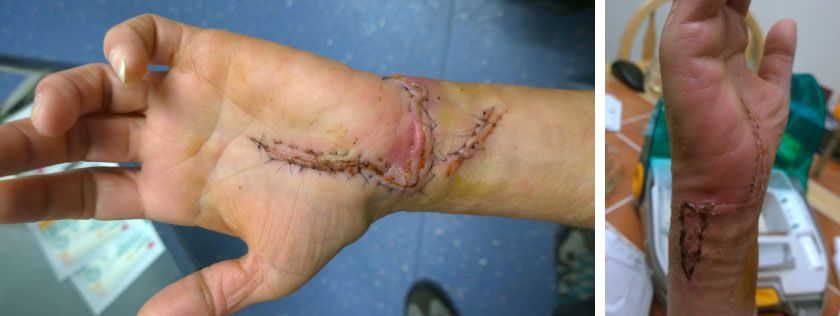Compensation for injured dog attack victim

Mrs Katrina Urquhart was on holiday with her husband at a caravan park when she was the victim of a dog attack.
They had brought along their own dogs to the caravan site and had met a fellow camper while out walking who was with his Alaskan Malamute dog. Mrs Urquhart greeted the dog and thereafter petted him.
A few days later, Katrina made her way across the caravan site. She stopped again to say hello to the dog. However, on this occasion, the dog turned on her aggressively, biting her arms.
Katrina was hospitalised for over a week and underwent surgery as a result of her injuries. She has been left with permanent scarring and permanent reduction in the strength of her grip.
On contacting our Inverness personal injury solicitors, they had to raise the case in court as the owner’s pet insurers denied any responsibility for the accident. The defending solicitors also denied responsibility throughout the preparation of the court case.
However, before the case was due to be heard in court, an offer of compensation was awarded to Katrina for the loss, injury and damage she suffered.
In Scotland, there are statutory provisions in place to ensure that in certain circumstances the keeper of a dog is found responsible for you or your child’s injuries. These rules can be found under the Animals (Scotland) Act 1987.
Under the 1987 Act, the keeper of the dog at the time of the injury is “strictly liable” if the injury was caused by “biting or otherwise savaging, attacking or harrying”.
So, the Act does not cover being knocked over by an overly affectionate dog, for example. If it can be demonstrated the injury was caused by biting or otherwise savaging then no more needs to be proven, even if the dog in question has never displayed such behaviour in the past.
It is important to bear in mind that the keeper of the dog must be identified in order for a compensation claim to progress. Under the 1987 Act the keeper of an animal is:
- The owner of the animal;
- The person in possession of the animal; or
- A person with “actual care and control of a child under the age of 16” who either owns the animal or has possession of it.
So, in the event that you or your child is attacked by a dog, it is very helpful to find out the identity of the owner or possessor of the dog. While dogs are privately owned animals, claims for dog attacks will usually be made against the owner/possessor’s household insurers i.e. the company they have their home contents insurance policy with.
If a claim is successful, the household insurers will be the ones to pay the compensation. While such household insurance details may not be exactly forthcoming in the immediate aftermath of a dog attack, we would encourage people to try to obtain details of any household insurance policies to prevent any long delays in securing compensation.
It must be noted that “strict liability” will not apply in cases where people provoke the dog into attacking them in self-defence. This is only for cases where injuries are caused by unprovoked attacks.